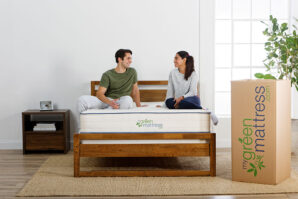With new temperature records being broken each day, and all kinds of extreme weather events happening around the nation and the world, the imperative to find more sustainable ways of living is getting more and more urgent. Living more ecologically is an essential approach to reducing our environmental impact and promoting a healthier planet. We’ve made a whole business out of it – by promoting the benefits of organic, sustainably-made mattresses.
However, eco-friendly living is also widely misunderstood by many. For this article, we thought we’d take a moment to debunk some of the persistent myths about sustainable living.
Seven Myths about Eco-Friendly Living, Debunked
Myth 1: Eco-friendly products are always more expensive.
Debunked: While some eco-friendly products may have a higher upfront cost, they often prove to be more cost-effective in the long run. For example, energy-efficient appliances and LED light bulbs may cost more initially but save money on utility bills over time. Additionally, some sustainable choices, like using reusable items instead of disposables, can save money over the long term.
Myth 2: Renewable energy is unreliable and expensive.
Debunked: Renewable energy sources like solar and wind power have become increasingly reliable and cost-competitive with traditional fossil fuels. Advances in technology and growing investments in renewable energy infrastructure have made it a viable and more accessible option for many individuals and businesses. See our recent article about making the switch to renewable energy for more information.
Myth 3: Ecological living requires giving up modern comforts.
Debunked: Embracing ecological living doesn’t mean sacrificing all modern comforts. It’s about making conscious choices to minimize waste and reduce environmental impact. For instance, you can adopt eco-friendly practices while still enjoying modern amenities like electricity, heating, and air conditioning.
Myth 4: Recycling is the ultimate solution to waste management.
Debunked: While recycling is important, it’s not a complete solution to waste management. The emphasis should be on reducing and reusing first. Recycling requires energy and resources, and not all materials can be effectively recycled. Reducing single-use items and opting for products with less packaging can be even more effective in reducing waste.
Myth 5: Organic farming always results in lower crop yields.
Debunked: Organic farming practices have evolved and can now be just as productive as conventional farming methods. By focusing on soil health, biodiversity, and sustainable practices, organic farming can achieve comparable yields while avoiding the use of synthetic chemicals and promoting long-term environmental sustainability.
Myth 6: Going green is an all-or-nothing approach.
Debunked: Adopting ecological living doesn’t mean you have to be perfect or make drastic changes overnight. Every small step towards sustainable choices can make a positive impact. Sustainable living is a journey, and even minor changes in lifestyle or habits can add up to significant positive changes for the environment.
Myth 7: Eco-friendly homes are unattractive and uncomfortable.
Debunked: Sustainable and eco-friendly homes can be aesthetically pleasing and comfortable. Green architecture and design focus on creating spaces that are not only energy-efficient but also visually appealing and functional.
Ecological living is a practical and achievable approach that benefits both individuals and the environment. By debunking these myths and understanding the real potential of eco-friendly practices, we can make informed decisions and contribute to a more sustainable future.









